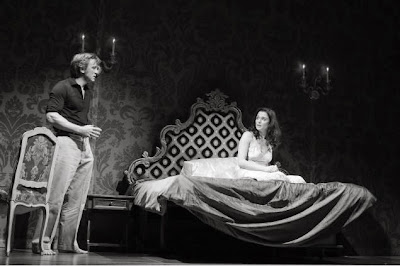 |
| "Love sought is good, but giv'n unsought is better." |
Angus Wright’s Sir Andrew Aguecheek and Paul Chadihi’s Maria give strong
performances. All actors perform the Bard with ease, humor and clarity.
Stephen Fry is a hoot as a lovesick swain, in yellow tights.
Mark Rylance steals the show as young Olivia, countess in mourning. He
is both measured and over the top as a young girl in love. Much has been made
of his athleticism. We saw Jerusalem
on the West End, in which he played a down-and-out. Rylance entered with a handstand
over a water trough, doused his head, and thereafter anything he did seemed
incredible. As Olivia, he is comically graceful—and pretty.
Clothing is hand-stitched and a close match to the
costumes worn in the 16th-century. As the curtain closes,
the six massive chandeliers over the stage are lowered and candles snuffed. Even
this was fantastic to watch. Twelfth Night is performed in rep with King Richard the Third. Shakespeare
diehards can see both shows in one day.
After
Twelfth Night, we felt in the mood to
go to a
classic pub. What would a British pub be like if reinterpreted here? It
might serve truffle popcorn, deep-fried pickles, sloppy joe sliders, fish tacos, and a
truly unique version of macaroni and cheese. A juicy steak would be on the menu, and for
dessert, molten brownie with vanilla ice cream.
 | |
| Paper-thin beef jerky at Rye House |
Rye House, in the Flatiron District, turns out all of these dishes and others,
including a sizzling pepper steak with extra-crispy fries. It is the classic
American pub menu. Their mixologist is famous for the Wake-Up Call and the
Perfect Storm. We found the Fall Breeze (house lavender syrup, bitters,
cucumber, mint, vodka) to be perfect.
 |
| Kale caesar with WI parm |












